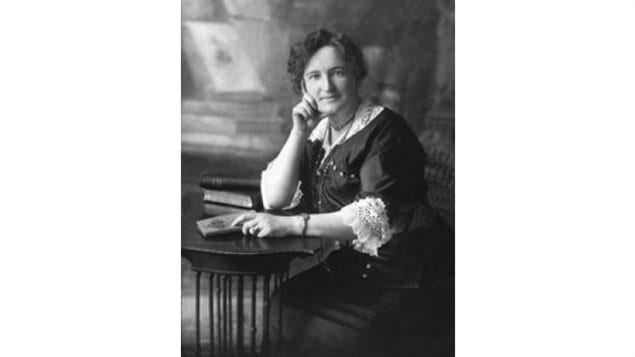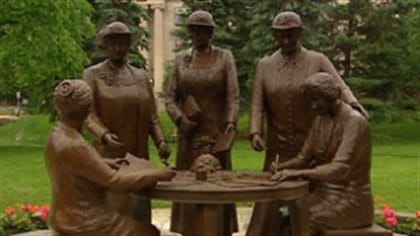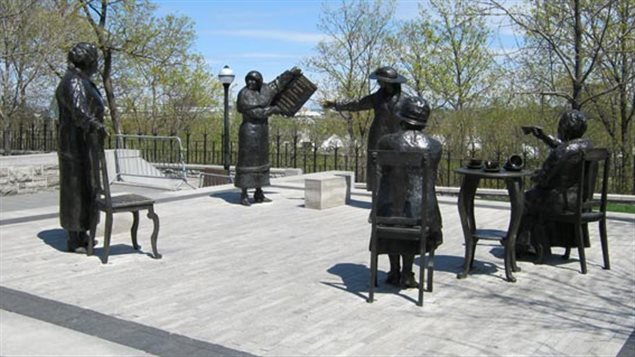Exactly 101 years ago today, women’s right to vote was at the centre of a long-standing debate in Winnipeg. Mrs Nellie McClung who had long advocated for social reforms in western Canada, formed a group called the Women’s Political Equality League.
“Give us our due!”
On this date she led a delegation to the Winnipeg Manitoba legislature to present several petitions for women’s suffrage.
She said at the time the delegation had come not to beg for a favour but to obtain simple justice. “Have we not the brains to think? Hands to work? Hearts to feel? And lives to live?” she demanded. “Do we not bear our part in citizenship? Do we not help build the Empire? Give us our due!

The government of the day rejected the idea, but was defeated in 1915 following a corruption scandal.
McClung then staged a very successful theatrical piece which presented a mock parliament in which the male/female roles were reversed and female politicians with McClung playing the role of the Manitoba Premier debated whether men should get the vote. The play was popular and ticket sales helped finance the suffrage movement.

With the First World War, now enabling many women to join the work force and do “men’s work”, the arguments against women’s suffrage began to be unsustainable
Although she later left Manitoba for Alberta, the provincial Liberal government she had campaigned for won the 1915 election. It was presented in January 1916 with more petitions with so many names, it obliged the government to table the issue for a vote on January 27, passing on January 28, 1916.
Manitoba thus became the first province to grant women the right to vote and hold provincial office.
This was followed the same year by Saskatchewan on March 14, and Alberta on April 19. British Columbia followed a year later on April 5, 1917, then Ontario a week later on the 12th. Nova Scotia changed its laws in April 1918, and New Brunswick in April 1919, and Prince Edward Island in 1922.
McClung, author and orator, was elected to the Alberta legislature in 1921.
In 1917, with so many men fighting overseas and so many women now in the work force further increasing their desire to have a voice, the federal government finally agreed to the increasingly powerful suffragette movement. In September it passed the “Wartime Elections Act” granting the vote to the wives, mothers and sisters of serving soldiers, as well as women serving in the armed forces.
This “half-measure” did not stop the pressure on the federal government, thus in 1918, all female “citizens” aged 21 and over became eligible to vote in federal elections, with the proviso they were “aged 21 or older, not alien-born and met property requirements in provinces where they exist.” In July 1919 women gained the complementary right to stand for the House of Commons, but still could not be appointed to the Senate, as they were deemed not to be “persons” eligible for senate position under the law.
McClung continued her suffrage campaign when, along with Irene Parlby, Henrietta Muir Edwards, Emily Murphy and Louise McKinney- who together became known as the “Famous Five”, they sent a petition to Ottawa to clarify the term “Persons” in Section 24 of the British North America Act 1867.
The petition sent in 1927, was defined in a Supreme Court decision in 1928 which declared that women were not “persons” under the law and could not be appointed to the Senate.
That decision was appealed and finally overturned once and for all by the British Judicial Committee of the Privy Council on 18 October 1929, which at that time still held the final word over Canadian law.
Only Quebec resists
It should be noted that the in the mainly French-speaking province of Quebec, the Catholic church and politicians and many citizens were against women’s suffrage, and fought against it for years.
“The entry of women into politics, even if only by suffrage, would be a misfortune for our province. Nothing justifies it, neither natural law nor the social interest; the authorities in Rome approve of our views, which are those of our entire episcopate.” (translated) wrote Cardinal Bégin as cited in a Quebec historical magazine in 1990 ( Cap-aux-Diamants, no 21, spring 1990, p. 23).
Also cited in the same edition of the historical magazine was a comment by Henri Bourassa who founded the newspaper Le Devoir, “…French-Canadian women risk becoming “public women”, “veritable women-men, hybrids that would destroy women-mothers and women-women.”
“The argument of the similarity with the other provinces is cited, as if for some, progress consists of aping what others do. Québec has its traditions, its customs and they are its strength and its greatness. Were this bill to pass, women would resemble a star having left its orbit” said L-A. Giroux, a legislative councillor (Wellington), on April 25,1940, recorded in the debates at the Legislative Assembly.
Faced with this strong opposition, women gained the right to vote in Quebec elections only in April 1940.







For reasons beyond our control, and for an undetermined period of time, our comment section is now closed. However, our social networks remain open to your contributions.